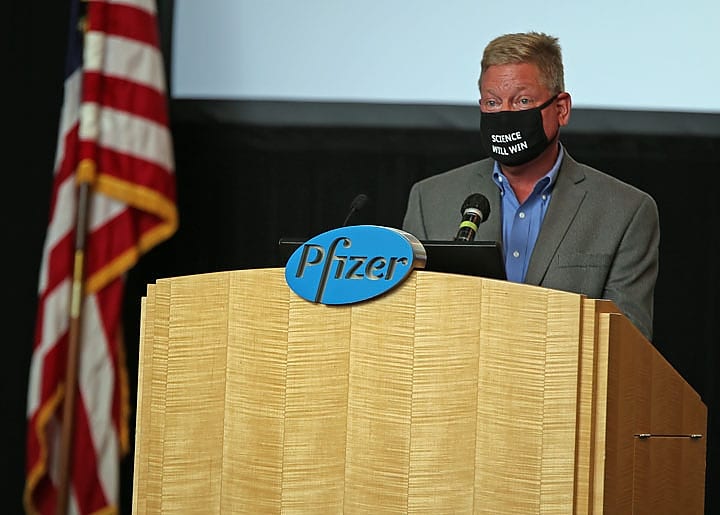Pfizer Readies Its COVID Vaccine for Clinical Trials

Audio By Carbonatix

John Burkhardt of Pfizer. Photo courtesy of CTNewsJunkie
The clinical trials for Pfizer’s vaccine could start as soon as the end of July, a company spokesperson said.
By Christine Stuart, CTNewsJunkie.com
Pfizer inked a $1.95 billion deal Wednesday with the U.S. government to produce hundreds of millions of doses of a COVID-19 vaccine.
Under the agreement, the federal government would receive 100 million doses and could acquire up to 500 million additional doses. The vaccine would be made by Pfizer even though it’s jointly being developed with BioNTech.
The vaccine development uses BioNTech’s proprietary mRNA technology. The BNT162 vaccine candidates are undergoing clinical studies and aren’t currently approved for distribution anywhere in the world.
The companies announced earlier this month that the first of four experimental vaccines they have been testing showed encouraging results in very early testing of 45 people.
There are 23 coronavirus vaccines in clinical testing right now, according to the World Health Organization.
Another Connecticut company, Protein Sciences, also is developing a vaccine.
The clinical trials for Pfizer’s vaccine could start as soon as the end of July, according to John Burkhardt, senior vice president of drug safety R&D and head of the Pfizer Groton site. They would still need to get Emergency Use Authorization from the FDA for those to proceed, which they believe will happen by October.
However, the companies expect to manufacture globally up to 100 million doses by the end of 2020 and potentially more than 1.3 billion doses by the end of 2021, subject to final dose selection from their clinical trials.
Pfizer said it also is working on medication to treat patients who are infected with COVID-19. It plans to begin clinical trials for an IV treatment by the end of this year and an oral treatment will follow.
“I think we’re just learning so much about this virus, about this infection,” Burkhardt said.
Burkhardt said scientists don’t know if the virus will mutate “and need a different version of the vaccine annually like you see with influenza.” He said as a scientific community, they don’t have those specifics yet.
Republished with permission from CTNewsJunkie.com, all rights reserved.
Like what you see here? Click here to subscribe to We-Ha’s newsletter so you’ll always be in the know about what’s happening in West Hartford! Click the blue button below to become a supporter of We-Ha.com and our efforts to continue producing quality journalism.



